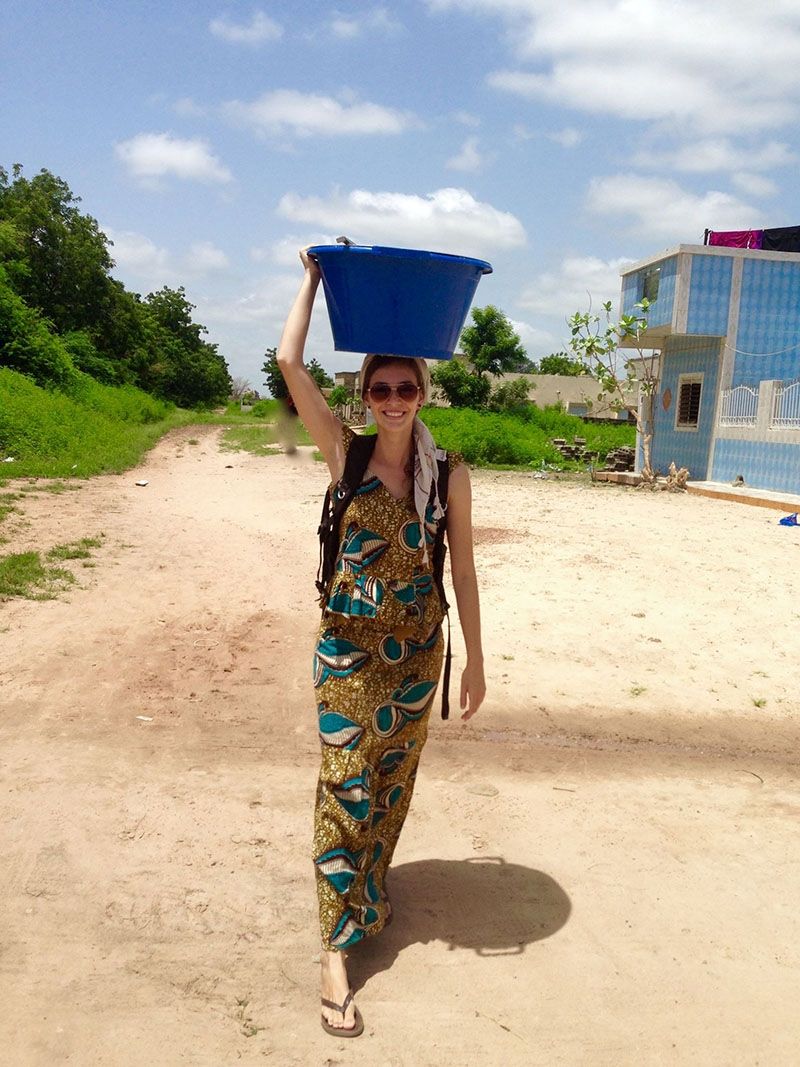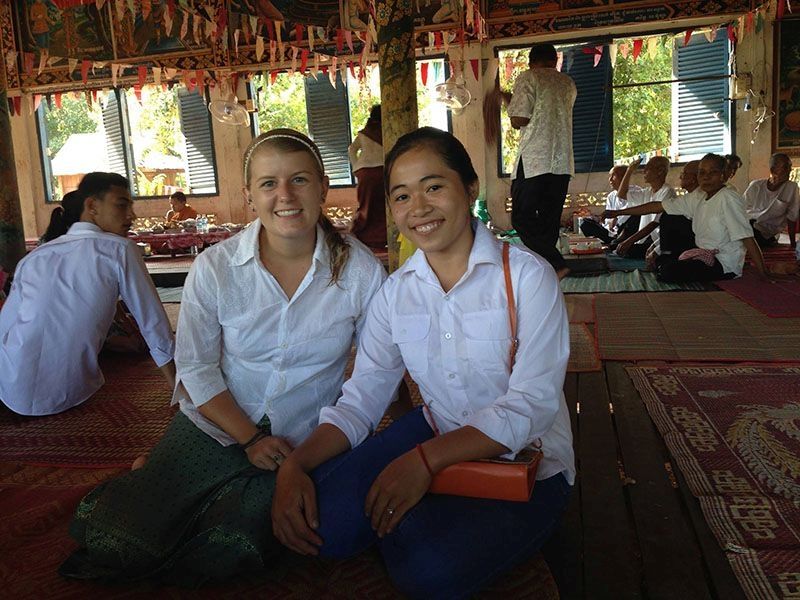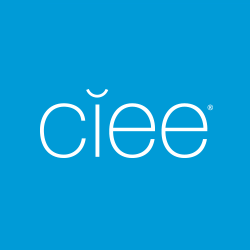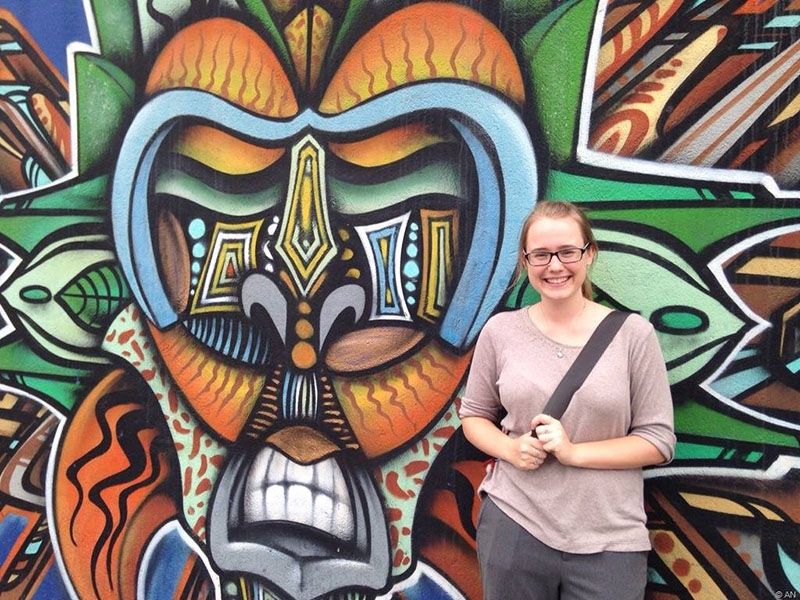Our Job is to Listen: From CIEE to Peace Corps
CIEE alumni Andrea Edman, Stefanie Smith and Isabon Thamm are current Peace Corps volunteers around the world. In honor of International Education Week, they shared their stories of how their study abroad led them to pursue the Peace Corps:
It’s been about two years and nine months since our plane arrived in Dakar, Senegal. None of us had ever been to Africa, and no matter how much we read online, we had no idea what to expect. Spring 2013 with CIEE turned into a semester we would never forget.
Andrea Edman, Peace Corps Cambodia
My name is Andrea Edman and I am 24 years old. I am an Education Volunteer with the Peace Corps, currently serving in Cambodia. Some of my primary projects include English teaching at the government school in my village, as well as English private classes. Some of my secondary projects are to improve the sports curriculum at my school and health of village members through a newly constructed all-purpose sports court, to educate students about environmental awareness through peer education and an environment club, to facilitate an arts club focused on music and dancing at my school, and to organize a 3-day arts camp for Cambodian High School Students country wide. I also have also participated with my students and led both a GLOW (Girls Leading Our World) and BUILD (Boys United in Leadership and Development) Camps in my province and intend to attend both again this coming year.
I am originally from Tacoma, WA and I attended University at The George Washington University in Washington D.C. I majored in International Affairs with a concentration in International Development and a minor in Theatre. In my free time (which comes and goes as a Peace Corps Volunteer) I enjoy reading, running around my village, drinking coffee and chatting with people, learning the guitar, meeting with my students, and watching TV shows under my mosquito net (guilty pleasure, I know.) A fun fact about myself is that my host family here in Cambodia got a puppy about a month into my service and we named him Gigi. Gigi has come to be one of my best friends in the village. Most Cambodian dogs are very independent and Cambodians don’t treat their pets like we do in America, but Gigi is a different story. He follows me around and greatly accepts my petting and praise. He brightens up everyday.
The phrase, “If it ain’t broke, don’t fix it” takes on a whole new meaning for me in Cambodia as Cambodians will reuse everything until it can’t be used any more.
If there was something you wanted Americans to know about your country of service, what would it be? Cambodians are probably the most resourceful people I have ever met. They reuse almost everything, fix problems with ingenuity, and never stress about the little things. It is not uncommon to see a moto piled high with goods for selling in the market. Even though the seller can’t afford a truck, they will figure out a way to get the goods there. Or the way my family used to pump water from our pond before we got a well. They had an ingenious invention of PVC pipes and a motor that once a week my host uncle would hook up in the rice field across the road and suddenly it would be like a waterfall at my house. The phrase, “If it ain’t broke, don’t fix it” takes on a whole new meaning for me in Cambodia as Cambodians will reuse everything until it can’t be used any more. I think Americans could definitely take a leaf out of the Cambodians book to cut down on unnecessary waste.
Stefanie Smith, Peace Corps Senegal
My name is Stefanie Smith and I am also 24 years old. I am a New Business Development volunteer in Senegal. Yes, I came back for more of this country. I primarily work with the Chamber of Commerce at the business creation office. My main project concerns the sexiest topic of all: trash. My town (with a population of over 40,000) does not have a trash collection service, so you can imagine the amount of it on the streets. We have developed a sustainable waste management system using local resources; and though it’s a long term vision, we are hoping that our trash collection system, along with our environmental education initiative, will make our city cleaner. My other primary projects include teaching entrepreneurship to youth and financial literacy to illiterate farmers. My secondary projects are teaching English and Math to children, as well as girls’ camps, empowering them to become the next leaders of the future.
My main project concerns the sexiest topic of all: trash.
I was born and raised in Monterrey, Mexico. I majored in International Business and French and minored in German at St. Edward’s University in Austin, Texas. Different languages and cultures have always interested me, so I studied abroad for 2 out of my 4 years at university. I was a product of a Mexican mother and an American father, so in my mind, I was destined to travel the world. I grew up trying to perfect as many languages as possible, starting with English. French was initially useful in Senegal (it is the official language), but to truly integrate myself, I had to learn Wolof, the local language. I do not always have free time, but when I do, I enjoy reading and hanging out with my host family. A fun fact about myself is that I had only biked a few times in my life before becoming a Peace Corps volunteer, and now I bike to work all the time. I am still a little clumsy at it, but I keep improving everyday.
Photo credit: Stefanie Smith
If there was something you wanted Americans to know about your country of service, what would it be? Senegalese are always willing to give, no matter how little they have. It is not rare that people will walk inside houses to use the restroom or to eat. Children will share anything they are eating without hesitation, even lollipops (health volunteers’ worst nightmare). Shoes and clothes are practically interchangeable; everyone is “allowed” to use each other’s things, even when there are 40 people in a house. My Peace Corps experience in Senegal has been extraordinary so far. This country opens your heart and your eyes, and it teaches you more about yourself and the world than anything else could accommodate.

Isabon Thamm, Peace Corps Costa Rica
My name is Isabon Thamm, and I am quickly on my way to 24. I am a TEFL (Teaching English as a Foreign Language) volunteer currently serving in Costa Rica. My primary projects include co-teaching at the high school, teaching community classes to local artisans, and preparing for a JumpStart (intensive English) camp to be held in January 2016. Side projects include co-leading a local youth group focused on environmental conservation and leadership, and giving the family dogs the love they deserve.
While Costa Rica is most well-known for being a surfer’s paradise with a thriving ecotourism industry, it’s indigenous communities remain remarkably hidden on the international stage.
Photo credit: Isabon Thamm
A year and a half ago, I graduated from Georgetown University with a French major, Spanish minor, and certificate in African Studies. I was born in Germany and, like Stefanie, to multinational parents. I figured out early on what it means to be a third-culture kid, and found out later that it comes with some pretty awesome perks - like feeling comfortable in a great gamut of cultural contexts. After having spent many years shouldered with the responsibility (financial, academic, etc.) of living in the nation’s capitol, I have come to Peace Corps to search not only for greater understanding between myself and my host country nationals, but also for my own inner Peace. To that extent, I spend much of my free time (which I always make sure to keep on hand) catching up on movies, reading, updating my Instagram (@imthamm), and exploring the surrounding mountains on foot.
If there was something you wanted Americans to know about your country of service, what would it be? While Costa Rica is most well-known for being a surfer’s paradise with a thriving ecotourism industry, it’s indigenous communities remain remarkably hidden on the international stage. Boruca is one of many reservations, and one of the better known with tourists. Though a very quiet mountain town eleven months of the year, its annual Festival de los Diablitos attracts enough visitors to provide 70% of the yearly town income through sales of traditional masks, woven arts, and food and lodging. In a world where economic viability rules, Boruca has sustainable means to protect its culture. Unfortunately, not all communities are so lucky.
A Path to Peace Corps
We began to think of Peace Corps as a career path at different times in our lives. It had been a life-goal of Isabon since high school. For Andrea, it was always in the back of her mind throughout college, and Stefanie, growing up in Mexico, didn’t know of the Peace Corps until her semester in Dakar. But it wasn’t until our experience studying abroad in Senegal with CIEE that we realized it was an important step in our lives. We have all been very fortunate to travel all over the world (thanks to supportive parents, school requirements, and/or different service opportunities) but it wasn’t until our time in Senegal that we really understood the value of fully immersing ourselves in another culture. There is so much to be learned from the world around us and Senegal was the first glimpse into the rich and vibrant melting pot that is our world.
We have all been very fortunate to travel all over the world, but it wasn’t until our time in Senegal that we really understood the value of fully immersing ourselves in another culture.
During our CIEE experience we had a week of rural visits. We chose to spend the week with currently serving Peace Corps volunteers (PCV) and this was when our decision to apply for Peace Corps was solidified. Different PCVs let us into their lives for a week and we saw not only the positive effect they had on their community but more importantly the positive effect their community had on them. They had formed strong relationships during their service and breached cultural barriers through communication, love and a deeper understanding of the language. We wanted that experience, we wanted to learn more about a country and its people the way those PCVs had. One thing that really stuck with us from Senegal was the phrase “Jamm Rekk” or “Peace Only” in English. This is something that is uttered in almost every conversation as you pass your peace on to others and accept their peace in return. After Senegal, we realized we didn’t want to stop searching for that Peace. We wanted to pass along a small offering of our own Peace as well.
We each arrived to our countries at different times. Andrea arrived in Cambodia 16 months ago, and 8 months ago, Isabon and Stefanie arrived in Costa Rica and Senegal. And as our service continues, we learn something new everyday. We learn about ourselves, the language, our host families, our students, and the food… We see the hardships that our host country nationals face, and even though they are not always the same as the hardships witnessed during our semester in Dakar, we understand that we all face difficulties in this world. We see happiness too, all over our countries. We see births, weddings, smiles, learning and laughter which always rise above the hardships. But most importantly we see that we are all just living in this world together and it is our responsibility to try to understand the lives of others in order to respect each other and show compassion. Countries all over the the world have more in common than one may at first believe, especially as they try to find their voices on a stage dominated by countries to the north. Thus, our job is to listen.
--
Read more stories of CIEE alumni and their path to the Peace Corps here.


